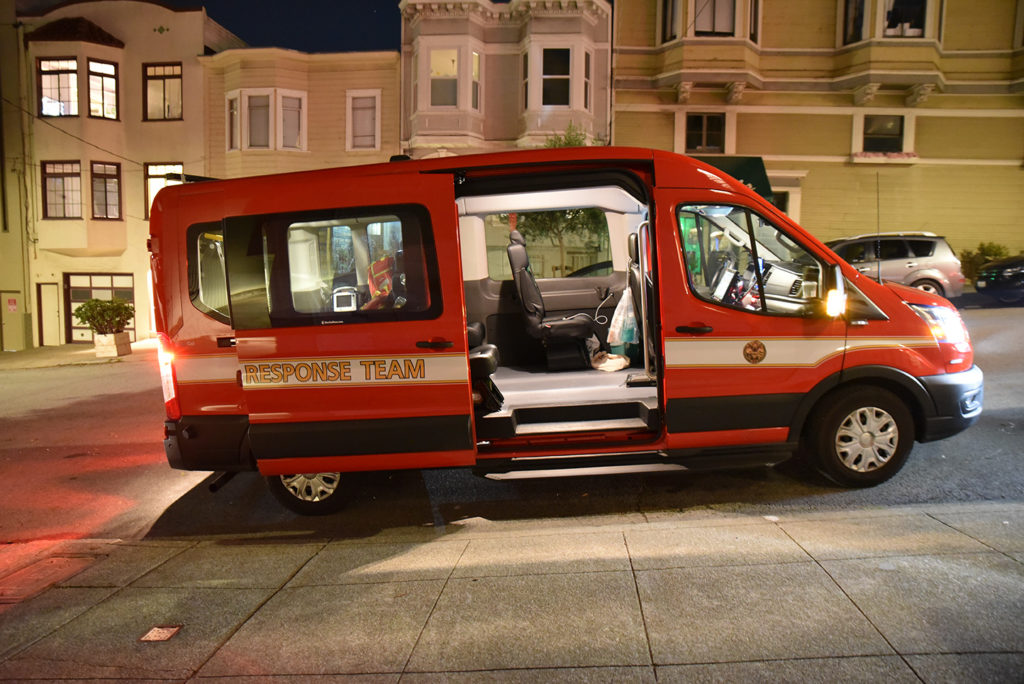San Francisco, CA
San Francisco Street Crisis Response Team (SCRT) – San Francisco, CA
December 7, 2021
The San Francisco Street Crisis Response Team (SCRT) was founded November 2020 to provide trauma-informed clinical interventions and care coordination for people experiencing behavioral health crises. Based in part on Eugene, Oregon’s CAHOOTS program, the team operates under the guidance of the San Francisco Department of Health, and is a collaboration of the San Francisco Fire Department (SFFD) and health services organizations such as HealthRIGHT 360 and Richmond Area Multi-Services (RAMS), with significant support from the Department of Emergency Management. SCRT responders can de-escalate situations on scene and assess the need for and provide medical treatment and linkages to follow-up care. Additionally, the team responds to “on-views,” which are incidents that the team observes when circulating in designated neighborhoods.
A secondary multidisciplinary team, the SCRT Office of Coordinated Care (OCC), provides follow-up services with people SCRT has encountered on calls to provide linkages to care, reconnection to existing providers, housing resources, case management, or other health related resources.
The following information outlines SCRT’s efforts since it began; it follows the sections of the toolkit. Readers can connect to other parts of the toolkit by clicking the headers for more details.

Community Engagement and Collaboration
- SCRT works closely with Mental Health San Francisco, a working group created by city leaders to help city residents access mental health support services. They are a key stakeholder in helping SCRT determine what services should be provided and how the teams should be deployed.
- SCRT OCC also works closely with the Department of Public Health, as well as community-based organizations to link SCRT clients to care and other resources following their crisis.
- The SCRT routinely conducts information-gathering sessions, such as in neighborhood forums, to engage with community stakeholders and people who have firsthand experience needing crisis response. These sessions help SCRT gain a greater understanding of the program’s impact and determine how it should continue to be updated.
- The SCRT has engaged with the following community groups and stakeholders to inform the program’s scope and function:
- Community-based organizations
- Department of Public Health programs
- City agencies
- Behavioral health consumer focus groups
- Citywide committees and working groups
Needs Assessment
- SCRT collects and analyzes data on 911 call volume and SCRT engagements in different zip codes within San Francisco to ensure they are properly serving the community.
- The rollout of the first six teams were done in order of need based on 911 call volume per area of the city, as well as other data such as call types. This helped determine the need for behavioral health crisis interventions in certain neighborhoods.
Call Triaging
- People can contact the SCRT by dialing 911.The San Francisco Department of Emergency Management (DEM) receives, codes, and sends calls to SCRT for review.
- SCRT responders currently address one specific call type: lower priority behavioral health crisis calls (code 800 priority b).
-
- Screening Process: San Francisco uses call types that build in screening questions. If a mental health crisis call involves weapons, imminent threat of violence or serious injury, it will be coded as 800a. The SCRT team only handles 800b calls, so no further screening is necessary. A Behaviorally Anchored Rating Scale (BARS) assessment is also completed by the team based on the dispatch information to help determine if the call is within SCRT scope.
- Dispatch Method: Dispatchers sends call information to SCRT for review, and SCRT can see pending calls in the police queue.
- Managing the Queue: Dispatchers can send messages to the community responders about incoming calls, and SCRT will take the most acute-sounding calls if there are multiple in the queue.
- SCRT responders will also address “on-views,” which are incidents that the team observes when out in the community circulating in designated neighborhoods.
Program Staffing
- SCRT operates six three-person response teams consisting of a SFFD community paramedic, a mental health clinician, and a peer counselor to provide rapid, trauma-informed response 24/7.
- SCRT responders use a multidisciplinary approach in their staffing model to provide therapeutic de-escalation and appropriate medical response.
- SCRT responds in a Ford Transit van that is equipped with emergency medical supplies, clothing, food, and water. If appropriate, the team will transport people to a non-emergency resource such as a shelter, psychiatric urgent care, or residential treatment. As SCRT teams field calls from 911, the city’s SCRT OCC staff provides follow-up linkages to mental health care, substance use treatment, and social service coordination.
Use of Data to Inform Decision Making
- SCRT has been providing monthly updates during their pilot indicators that include:
- Crisis calls handled by SCRT
- Number of 800b calls received by SCRT
- Average response time
- Referral source
- Client engagements
- Office of Coordinated Care follow-up rate
- Connections to care
- Client characteristics
- Client living situations
- From November 30, 2020 to October 30, 2021, SCRT received 4,597 calls, with only 79 calls needing police assistance (1.6 percent)
- These calls were for multiple needs, including for traffic control, assistance with a client, an “on view,” etc.
Financial Sustainability
- The SCRT program has a projected budget of $13 million a year, paid for by a city business tax.
- San Francisco has also secured private support from the Robert Wood Johnson Foundation to fund a rigorous evaluation of SCRT.
Legislative Strategies
- SCRT was created through Mental Health San Francisco legislation (File No. 191148).










